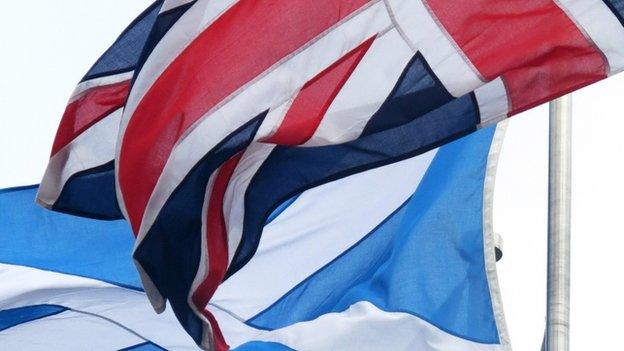Westminster doing 'no preparation for Scots independence'
- Published
- comments

Politicians and civil servants are not putting contingency plans in place for Scotland going alone, according to government sources.
Call me naïve, but I thought the government would be making contingency plans for the possibility that the Scots vote for independence.
Perhaps we should now call this more than a possibility, given that opinion polls show momentum, external behind the independence campaign.
The so-called "Better Together" campaign still has the edge, but seemingly not much of an advantage any longer.
Anyway, it would be quite a big deal (to put it mildly) if we were to wake up on 19 September to find Scotland had chosen to go it alone.
So I assumed that ministers and Whitehall would be working secretly to eliminate the interwoven political, economic and financial uncertainties that would be created by a vote for independence.
I was wrong.
Well-placed government sources tell me that no such work is going on. Why not?
"We assume we will win the campaign", said one source.
"It would undermine the credibility of our opposition to independence", said another.
Which is all very well, except for one thing: as we approach the vote, if it were to look as though the Scots were heading for exit from the United Kingdom, investors - who control the gazillions that in turn determine the price of our money - would get the jitters.
For the world's important money managers, there are three interlinked questions.
1) Could Scots realistically have a vote in the UK general election of 2015, if they were soon to be part of an independent state - and what would that mean for how the selection of the next rest-of-UK government was made and for the long-term governance of the UK?
To state what you presumable know (sorry), investors like to know how a country is governed.
2) How would the assets and liabilities of the UK be carved up?
3) How safe and sound would Scottish based Royal Bank of Scotland be, without guaranteed future access to emergency funding from the Bank of England and in the absence of clarity about which currency it would use in future to borrow?
There are lots of possible answers to these questions - which I will be exploring in coming weeks (I am making a BBC2 film about all of this).
But the main - and obvious - point to make is that investors hate uncertainty.
So if the UK government isn't ready with some kind of action plan on September 19, what would happen?
Well big players in the market tell me that sterling would probably fall - with potentially inflationary consequences (though exporters would be pleased).
The price of riskier UK assets would also probably fall - especially those of companies with big UK and Scottish exposure.
And, paradoxically, the price of UK government bonds or gilts might actually rise, because investors might do the kneejerk thing of investing in the assets perceived to be least risky - even though there would be a theoretical possibility of an independent Scotland refusing to take on any share of the national debt, thus leaving more of it to be borne by taxpayers in England, Wales and Northern Ireland.
As for RBS, it might find borrowing became quite a lot more expensive, and it might even see withdrawals by risk-averse creditors.
The big simple point is that the day after an independence vote would feel quite messy. Which is why, as I say, it feels a bit strange that the pols and mandarins aren't doing a bit of rainy-day preparation.